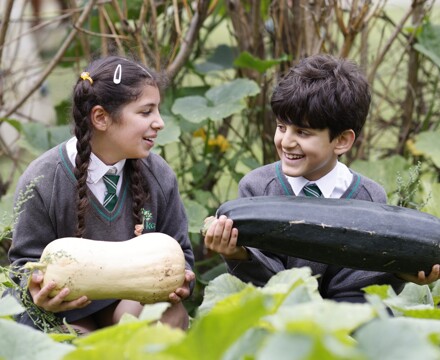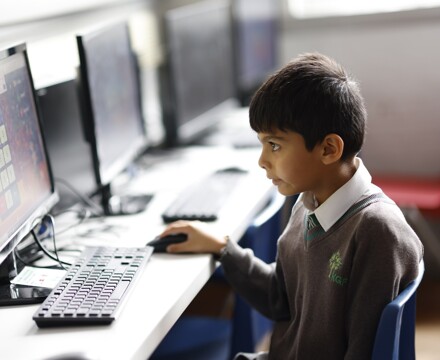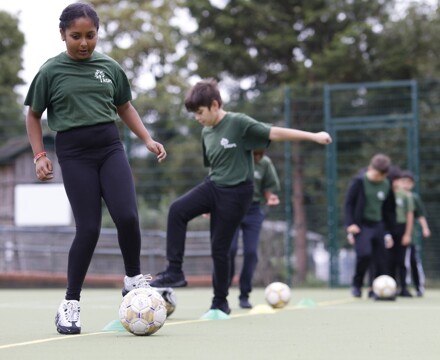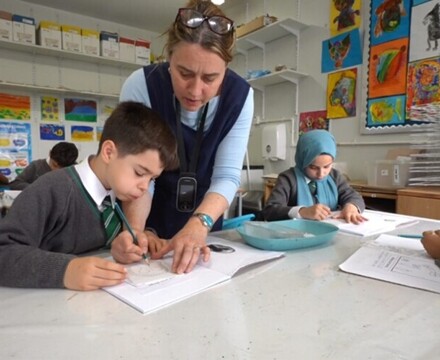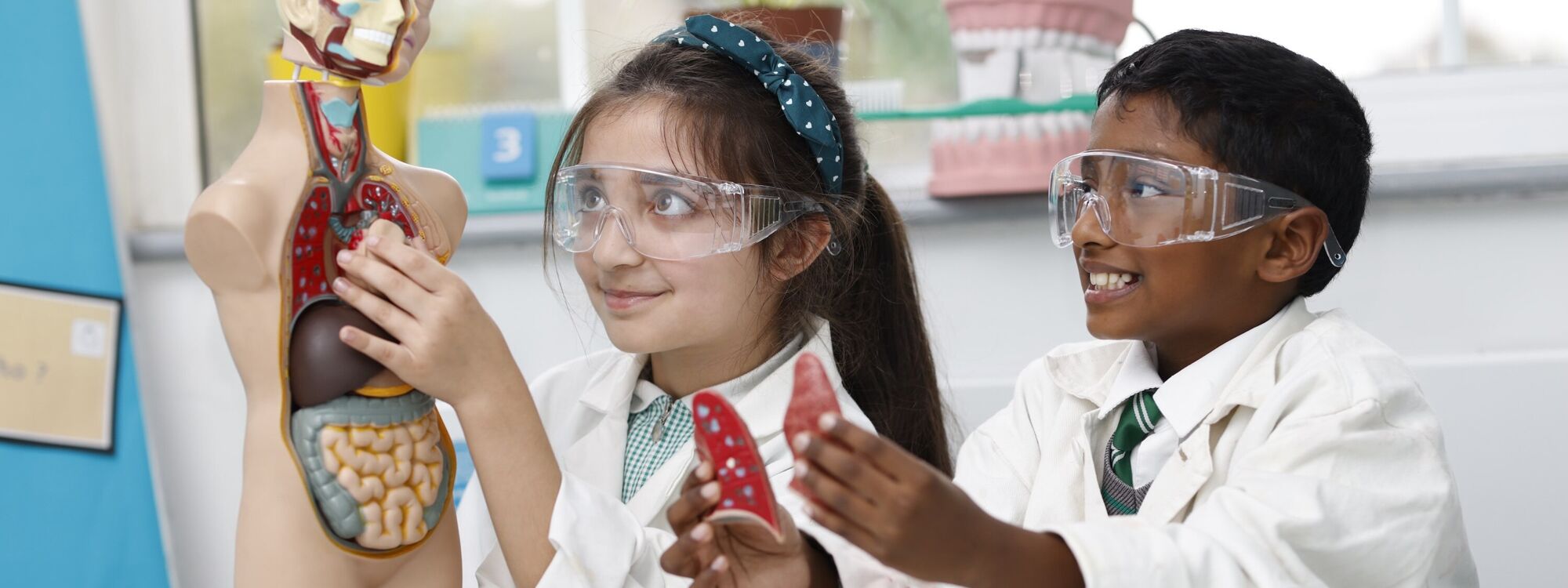
- Home
- Curriculum
- In the Classroom
- Subjects
Subjects
English
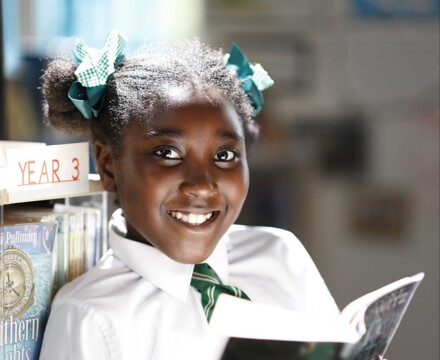
Our school has a diverse population with pupils from a range of cultural and demographic backgrounds. Therefore, the function of the English curriculum is one such that it provides children with ‘windows’ to worlds beyond their own, as well as ‘mirrors’ designed to empower pupils to see their own realities reflected.
Our English curriculum also aims to create fluent and enthusiastic readers, and confident writers. We know how much enjoyment children derive from reading a text with their class, and for this reason, we structure our curriculum around texts that provoke children’s curiosity and excitement.
Reading
At Kingsbury Green Primary School, we understand the important role reading plays in the lives of our children and how it can impact other areas of the curriculum. We believe that reading feeds children’ imagination and opens doors to a new world for curious, young minds. We feel strongly that reading is at the core of all learning and is therefore at the core of our curriculum. At our school we have made reading an integral part of learning knowing how central to the growing minds of our future generations.
It is therefore our aim that by the end of their primary education, all children at Kingsbury Green Primary School are able to read fluently and with confidence, in all subjects and be able to read a range of genres.
At Kingsbury Green, we understand that reading comprehension is broken into different skills blocks that children must master in order to read fluently and with confidence in all subjects and texts of different genres. These begin with the foundational knowledge (phonological awareness, print knowledge, grammar, and vocabulary building) that progresses to more complex reading skills (decoding, full word recognition, fluency, inference, comprehension monitoring, and test structure).
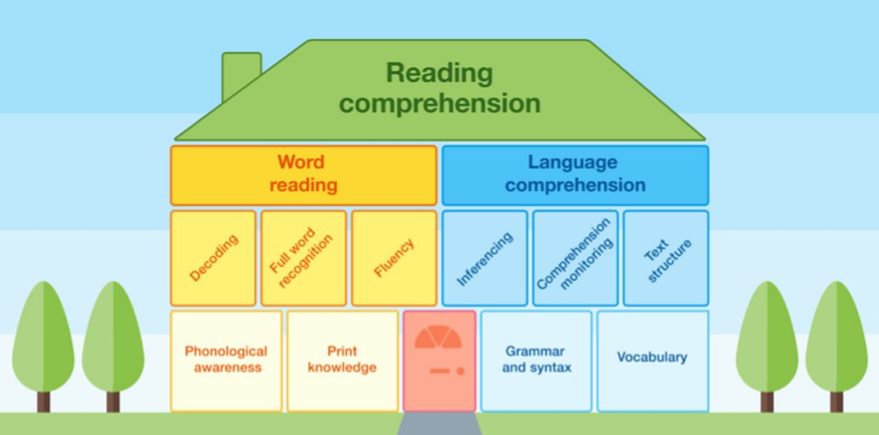
Image from Education Endowment Fund (Through the keyhole of the Reading House)
The teaching of reading therefore focuses on developing pupils’ competence in both word recognition and comprehension. Phonics is emphasised in the early teaching of reading, whilst comprehension skills are developed through children’s experience of high-quality discussion with the teacher during the lessons as well as being exposed to a range of stories, poems, and non-fiction.
Word Reading (Phonics)
Children are taught a range of strategies in order to help them read fluently, including whole word reading, and phonics using the Read, Write, Inc. scheme. Phonics lessons are taught daily at a level appropriate to each child’s learning from Reception to year 2 where they learn to recognise and apply the sounds made by individual letters, e.g. m,s,a and by groups of letters e.g. -ay, -ee, -oo.
The children gradually learn to practise and apply their knowledge of sounds through reading a range of books and by writing simple sentences.
Children are given a statutory phonics test to assess their single word reading skills at the end of Year 1, Those who are still not secure with decoding after the end of Year 1 are given additional small group support.
Language Comprehension (Reading with understanding)
Comprehension is understanding the meaning of written language. Whilst the phonetic knowledge supports pupils to be able to read and spell the words they see; comprehension practice supports pupils to understand what those words are and what they mean when put together in a phrase or sentence.
Comprehension is central to reading and children are given opportunities to improve their skills through a range of whole class (shared reading) and small group (guided reading) opportunities.
We provide children with opportunities to read and listen to a range of carefully selected high quality texts which stimulate them as readers, writers, and thinkers. These include detailed close reading of selected passages, oral and written re-telling of texts and targeted questions to build their retrieval skills and deeper understanding of a text.
All children are encouraged to read widely across both fiction and non-fiction so that they are exposed to several forms of texts, genres and structures as well as develop their knowledge across the curriculum and of the world in which they live in.
To read our school's Reading Policy, click HERE.
Writing
At Kingsbury Green, we aim for our children to read and write with fluency and assured control in order to grow as confident communicators with an understanding on how to use a range of independent strategies to self - monitor and self- correct. Our English curriculum is designed to offer children opportunities to understand a range of text types and genres and be able to write in a variety of styles and forms. We encourage children to have an interest in words and their meaning in order for them to develop a growing vocabulary, which is an essential component when communicating a message with precision.
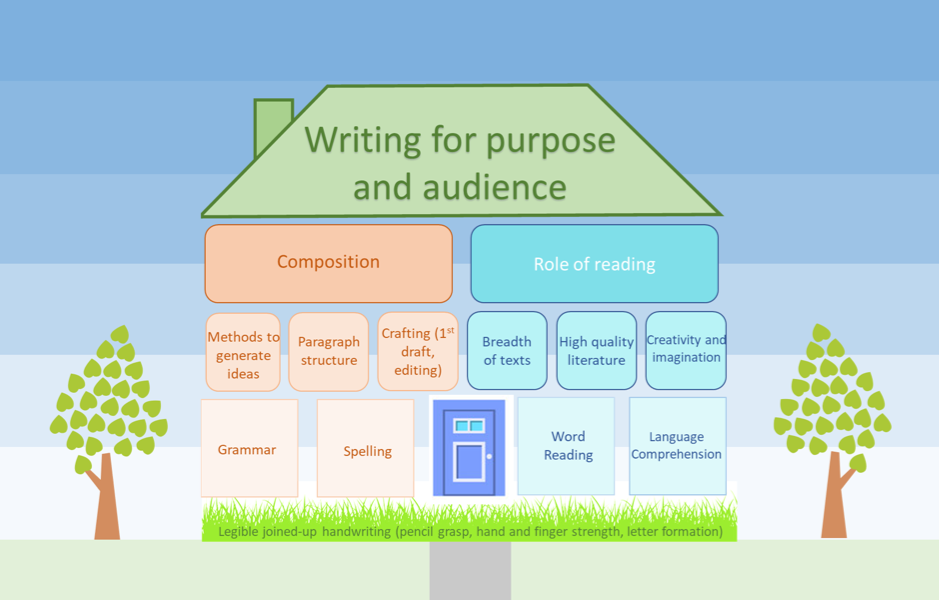
Image to show all the components needed to write for an audience
Role of Reading
In Kingsbury Green we believe that children write well when stimulated by high-quality texts and genres. Our English curriculum has been written to ensure that children have effective models to draw on in their own writing. The way writing is taught allows children think as writers with audience and purpose in mind. We also acknowledge that the more children read, the better they can build up and expand their knowledge. They can be open to new ideas and have an understanding of new things. This encourages creativity and imagination that allows children to innovate their writing.
Composition
Composition is the way a writer crafts words, sentences, and paragraphs to create a coherent piece of writing. A typical unit of work in English lasts 3 weeks and after an initial period of immersion in the text, children produce a complex extended piece of writing. To do this, they have the chance to generate ideas, plan, write, edit, and rewrite over several weeks working using models and detailed feedback from staff or peers. Effective composition involves articulating and communicating ideas, and then organising them coherently for a reader. This requires clarity, awareness of the audience and purpose as well as a wide knowledge of vocabulary and grammar.
Please read the school’s English Writing Journey for further detail on how the process of a writing unit.
Children are taught to write in a variety of styles in context such as narrative, persuasive, journalistic, recounts and reports. Children learn how to vary sentences, make interesting and ambitious word choices, and use grammar and punctuation correctly drawing upon their reading.
As part of the writing process, children have opportunities to develop their spoken language. As part of the ‘Immersion’ phase, children engage in discussions about the text where they articulate and justify answers, arguments and opinions as well as ask relevant questions to extend their understanding and knowledge. Through drama, role-play and hot-seating strategies, children use spoken language to get into a role of a character to empathise. Through debates, discussions and presentations, children participate actively in conversations and use spoken language to speculate and explore ideas.
Handwriting
Good handwriting is an essential skill in the quest to spell and write fluently, confidently and competently. A joined handwriting style links kinaesthetic ‘muscle memory’ with the relationship between the sounds of our speech and the letter shapes, letter groupings and whole written words.
The schools use Debbie Hepplewhite cursive handwriting as our agreed writing style. This ensures that there is a continuity of handwriting style from Early Years Foundation Stage through to the end of Key Stage 2.
Please read the school’s Handwriting Policy for further detail on our expectations of Handwriting
Learning Journey Overview - WritingHome Reading Strategy
Poetry by Heart competition
Classic Poems Collection - Choose TwoFreestyle Poems Collection - Choose One
Mathematics
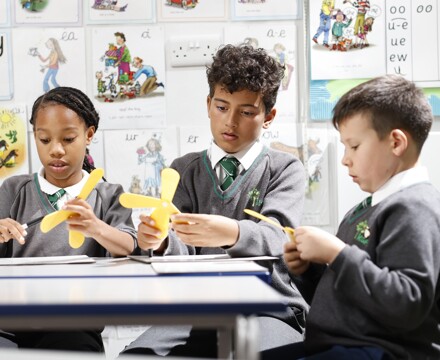
Mathematics is one of the core subjects and is taught explicitly every day from Reception to Year 6.
Mathematics is a key skill which children will use all their lives. Here at Kingsbury Green Primary School we aim to deliver a high-quality Mathematics curriculum that provides a foundation for understanding the world, an appreciation of the beauty and power of Mathematics, and a sense of enjoyment about the subject. We place great emphasis on deepening conceptual understanding and mastery of number, application of skills, problem-solving and practical tasks coupled with learning and memorising key number facts such as multiplication and division tables as soon as possible. Mathematical concepts are further enhanced by using and applying these skills across other areas of the curriculum.
Our Vision for Mathematics
- Children to have a real love for maths and approach the subject with a ‘can-do’ and positive attitude
- Children to be fluent with the four operations (addition, subtraction, multiplication and division) by the time they leave primary school so that they have a strong foundation for secondary school
- Children to talk confidently and proudly about their learning in maths using taught mathematical vocabulary
- Children to have opportunities to reason and problem solve, and present this in a way that works for them
- Children to make direct and indirect links with different areas of maths as well as links across other subjects
- Children to understand the importance of maths in the real world and its place in everyday tasks/activities
- Children to use maths to challenge inequality and all children have the mathematical knowledge to benefit from future economic well-being
The Aims of our Mathematics Curriculum are that:
- All our children acquire a deep and secure conceptual understanding of Number as the firm foundation for developing fluency.
- All our children develop a range of mental calculation strategies and by the end of LKS2 they are secure with using a written method for all four rules of Number. They make reasonable and informed decisions when choosing the most efficient strategy/method when calculating.
- All our children can apply their knowledge and understanding in a range of contexts.
- All our children develop a problem-solving approach; building skills of resilience and perseverance and making links with the wider world.
- All our children can reason and draw upon a repertoire of mathematical vocabulary to support their arguments.
- All our children have equal access to rich mathematical learning experiences regardless of race, culture, gender, special educational needs or disability.
- All our children are stretched and challenged.
- All our children are passionate about Mathematics.
How we teach Mathematics at Kingsbury Green Primary School:
EYFS
Mathematical development in the Early Years Foundation Stage provides children with learning opportunities in two specific areas: Number; practising and improving their skills in counting numbers to twenty, adding and subtracting single digit numbers and Shape, Space and Measures; recognising, creating patterns and comparing size and quantities to solve problems. Our children enjoy daily, discrete, whole class Mathematics lessons and these are supported by linked independent and guided group activities. There is a strong emphasis on mathematical concepts being given a real life context and a practical application using concrete tools. Children enjoy learning through song and role-play.
ELG Number
- Have a deep understanding of number to 10, including the composition of each number.
- Subitise (recognise quantities without counting) up to 5.
- Automatically recall (without reference to rhymes, counting or other aids) number bonds up to 5 (including subtraction facts) and some number bonds to 10, including double facts.
ELG Numerical patterns
- Verbally count beyond 20, recognising the pattern of the counting system.
- Compare quantities up to 10 in different contexts, recognising when one quantity is greater than, less than or the same as the other quantity.
- Explore and represent patterns within numbers up to 10, including evens and odds, double facts and how quantities can be distributed equally.
KS1
In Years 1 and 2, children’s mathematical learning is based on a concrete, pictorial then abstract method. At the same time as following the National Curriculum Mathematics Programmes of Study, great emphasis is placed on practising and securing number facts to achieve mastery and form firm foundations on which to build fluency. Mathematical topics are slimmed down to allow for greater time and depth of learning. Children are encouraged to deepen conceptual understanding and apply problem-solving using concrete tools and pictorial approaches before the use of abstract models. Our children are also encouraged to develop their speaking and listening skills and acquire a rich diet of mathematical vocabulary with which to support reasoning. Alongside their daily Mathematics learning, our children also participate in additional whole class Maths Meetings. These provide opportunities for key mathematical concepts to be pre-taught and reinforced.
KS2
In Years 3 to 6 children follow the National Curriculum Mathematics Programmes of Study. These are set out in six domains:
- Number – including Number and Place Value, Addition and Subtraction, Multiplication and Division and Fractions including Decimals (Year 4, 5 & 6) and Percentages (Year 5 & 6).
- Measurement.
- Ratio and Proportion (Year 6 only).
- Algebra (Year 6 only).
- Geometry – Properties of Shapes and Position and Direction.
- Statistics.
As in KS1, our children enjoy daily, discrete mathematics lessons. Programmes of Study are each given a week long focus and this enables topics to be covered in depth and allow opportunities for children to build upon and apply their skills and understanding. Children are encouraged to communicate their findings clearly for an audience. Each lesson begins with regular counting, and warm-up activities are used to develop mental fluency in Number. Mental arithmetic is assessed towards the end of every week. Children are also expected to learn their multiplication and corresponding division facts to 12×12 and are tested on a weekly basis. Problem-solving is actively promoted within each lesson for key groups of learners and towards the end of every week the whole class participates in mathematical investigations. In addition to discrete lessons, our children also engage in additional mathematical learning opportunities across the curriculum, e.g. in Science when collecting data.
Structure of a Maths lesson at KGPS:
In each maths lesson, children first complete the Flashback 4 (questions from the previous lesson, previous week, previous unit and previous year) and this supports our children into learning more and remembering more. This is then followed by counting, which helps children to develop their fluency by recalling their multiplication/division facts and it also supports them in making connections with other related facts. We then follow the structure of ‘I do’, ‘We do’ and ‘You do’. The ‘I do’ part of the lesson is where the teacher models the mathematical concept using concrete and pictorial resources before moving onto abstract concepts. This is then followed by ‘We do’ where the children work with the teacher before the ‘You do’ where the teacher assesses whether children have grasped the mathematical concept through independent practice. This method of modelling has been chosen to support our children into moving together towards a mastery approach and to ensure that learning is broken down into small, manageable steps so that all children at Kingsbury Green Primary School feel successful.
Whole School Mathematical Events
Our children enjoy participating in whole school and year group learning experiences that promote learning about mathematics within the wider world. Previous events that children have found highly engaging have included Maths in Stories and Art, Enterprise projects and Numbers Day linked to fundraising. This has also highlighted their role as global citizens. Children from upper KS2 have also enjoyed huge success over the years representing our school at mathematical challenges within the borough and across London.
Resources which can help at home
Timestable Rockstars
Timestables are an essential part of mathematics – some call it the foundation of maths. When children have quick recall of their timestables and a strong understanding of the related division facts, this opens up many other areas of maths to them. As a school, we have set up a Times Tables Rockstars League for our KS2 children and they take part in weekly battles for fun. Please encourage your child to complete TTRS at home as this will help support them in all of their maths learning.
Click here to access Times Tables Rock Stars
Mathletics
Mathletics is aligned with White Rose Maths which is the scheme of learning we follow as a school. Teachers assign activities in line with what children are learning in class so this provides them with additional opportunities to practise learning from class and master mathematical concepts. Please encourage your child to engage with this as it will help to reinforce learning from class.
Click here to access Mathletics
Additional documents
If you would like a more detailed insight into how maths is taught at Kingsbury Green Primary School, please take the time to read through the policies below. These give a comprehensive overview of the White Rose maths scheme and how it is incorporated into our maths lessons. Each calculation policy also highlights the skills we teach, the models we use and a detailed glossary of maths terms.
Calculation Policy - Addition and Subtraction
Calculation Policy - Multiplication and Division
Mathematics Vocabulary ProgressionCurriculum Progression Mathematics - Big IdeasDepartment for Education Math Guidance - IntroductionDepartment for Education Math Guidance - KS1 and KS2
Science
Intent
Science teaching at Kingsbury Green Primary School aims to give all children a strong understanding of the world around them whilst acquiring specific skills and knowledge to help them to think scientifically, to gain an understanding of scientific processes and also an understanding of the uses and implications of Science, today and for the future. Our school curriculum values of Ambition, Character, Empathy are reflected in themes which drive each science unit of study.
At KGPS, scientific enquiry skills are embedded in each topic the children study and these topics are revisited and developed throughout their time at school. Topics such as Plants are taught in Key Stage One and studied again in further detail throughout Key Stage Two. This model allows children to build upon their prior knowledge and increases their enthusiasm for the topics whilst embedding this procedural knowledge into the long-term memory.
All children are encouraged to develop and use a range of skills including observations, planning and investigations, as well as being encouraged to question the world around them and become independent learners in exploring possible answers for their scientific based questions. Specialist vocabulary for topics is taught and built upon, and effective questioning to communicate ideas is encouraged. Concepts taught should be reinforced by focusing on the key features of scientific enquiry, so that pupils learn to use a variety of approaches to answer relevant scientific questions.
Implementation
Teachers are currently provided with additional planning time in addition to their PPA, to develop and plan their curriculum. As part of this planning process, teachers to plan the following:
- A knowledge organiser which outlines knowledge (including vocabulary) all children must master;
- A cycle of lessons for each subject, which carefully plans for progression and depth;
- A low stakes quiz which is tested regularly to support learners’ ability to block learning and increase space in the working memory;
- Challenge questions for pupils to apply their learning in a philosophical/open manner;
- Trips and visits from experts who will enhance the learning experience;
Impact:
Our Science Curriculum is high quality, well thought out and is planned to demonstrate progression. If children are keeping up with the curriculum, they are deemed to be making good or better progress. In addition, we measure the impact of our curriculum through the following methods:
- A reflection on standards achieved against the planned outcomes;
- Tracking of knowledge in pre and post learning quizzes;
- Pupil discussions about their learning;
Learning about the environment
We use our own extensive grounds and the Fryent Country Park as our outdoor classrooms. As an Eco-school, concern for society, the place of science in understanding the world, and the sustainability of the planet are key drivers.
Our Gardening Curriculum
Children have the opportunity in various year groups to take part in our gardening curriculum, learning skills and gaining knowledge in horticulture, biology, and geography in addition to team work, communication, speaking and listening. We have extensive vegetable plots which are the focus also for scientific learning.
Computing and IT
Curriculum Intent
At Kingsbury Green, our aim for Computing is to provide every pupil with a high-quality computing education that enables them to make sense of and contribute positively to the technologically diverse world that we live in.
Implementation
We teach an inclusive and ambitious Computing curriculum that covers the knowledge and skills required to meet the aims of Computing in the National Curriculum, while focusing on its three aspects:
- Computer Science [CS]: this is the core of the Computing curriculum and covers principles like algorithms, programming (e.g. BeeBots/MBots and Scratch) and data representation, as well as understanding how computer systems and networks function
- Information Technology [IT]: the effective use of computing technology for functional purposes e.g. creating music, videos and animations, saving, organising and retrieving work, blogging, manipulating data
- Digital Literacy [DL]: the safe and responsible use of technology, including Online Safety, online identity, understanding digital footprint and online risks relating to Content, Contact, Conduct and Commerce.
Pupils in both KS1 and KS2 are taught Computing as a discrete subject for up to 1 hour every week either in our well-resourced Computing Suite or as unplugged lessons (without being hands-on on a digital device). In addition, children have access to iPads within their year groups to use in class to enhance their learning across the curriculum e.g. to research using the internet and to complete end-of-lesson quizzes. In the Early Years, the children’s learning of Computing is centred on play-based, unplugged activities that focus on developing their speaking and listening, curiosity, problem-solving and creativity.
We primarily use the National Centre for Computing Education’s [NCCE] Teach Computing curriculum to deliver our Computing lessons. It is a spiral curriculum, which means that children revisit the same concepts at least once each academic year to ensure that these are well-embedded and that the learners acquire knowledge that builds on previous knowledge. As a school, we also subscribe to the London Grid for Learning [LGfL] which provides the children with access to high-quality, cross-curricular learning resources that allow our pupils to consolidate and extend their learning in school and at home.
Teachers assess learners in each lesson and plan opportunities for them to remember more through regular retrieval practice at the start and during each lesson. Online safety is a key part of the curriculum and is a continued focus throughout the year.
Impact
Learning in Computing will be enjoyed across the school. Teachers will have high expectations of pupils and be able to provide good quality evidence of children’s learning in the subject. Children will be confident to use a range of digital devices and technologies (hardware and software) and produce digital artefacts. KGPS children will leave KS2 as knowledgeable, confident and responsible citizens of our digital world that extends beyond school, understanding they have important choices to make.
KS2 IT Pupil AgreementEY KS1 IT Pupil AgreementComputing Curriculum Overview
Geography
Intent
Our intention through the geography curriculum are that the school values of Ambition, Character and Empathy (concern for society) be addressed and that our curriculum intentions of fluency, reasoning, problem solving and self-regulation be exercised as geographers.
Our intention is that all pupils
- Develop contextual knowledge of the location of globally significant places – both terrestrial and marine – including their defining physical and human characteristics and how these provide a geographical context for understanding the actions of processes
- Understand the processes that give rise to key physical and human geographical features of the world, how these are interdependent and how they bring about spatial variation and change over time
- Develop competence in the geographical skills needed to: collect, analyse and communicate with a range of data gathered through experiences of fieldwork
- Interpret a range of sources of geographical information, including maps, diagrams, globes, aerial photographs and Geographical Information Systems (GIS) and communicate geographical information in a variety of ways, including through maps, numerical and quantitative skills and writing at length
Implementation
Based on research of learning and cognition our curriculum is designed so that learning is built on over time. The curriculum is organised to address core themes that will be visited horizontally across a year group and vertically visited as children progress through the school. Themes will also be visited “diagonally” through other subjects and at other times.
Six major themes have been selected. These are settlement, population, sustainability, trade, climate and landscape.
Learning in Geography involves
- Lessons with depth
- Core knowledge supported by the use of knowledge organisers
- A clear purpose for the learning centered around a core theme e.g. settlement
- Children acquiring knowledge through reading and discussion, taking notes and showing their knowledge through retrieval, testing and quizzing
Impact
The impact of the geography curriculum will be measured in the following ways
- Pupil voice – children able to confidently talk about their learning and recall recent and previous learning
- Pupil voice – children able to show how geographical knowledge is impacting on their choices as citizens
- Standards and quality of children’s learning as evaluated through learning reviews, knowledge assessments and essays
History
Intent
“History helps pupils to understand the complexity of people’s lives, the process of change, the diversity of societies and relationships between different groups, as well as their own identity and the challenges of their time.” NC Programme of Study.
Our intention through the history curriculum are that the school values of Ambition, Character and Empathy.
Our intention is that all pupils:
- Are inspired to be curious to know more about the past with the ability to ask perceptive questions, think critically and develop perspective and a point of view
- Know about the history of these islands in a coherent and chronological way to understand change and continuity
- Know and understand significant aspects of the history of the wider world
- Gain and use a historically grounded understanding of abstract terms such as ‘empire’ and ‘leadership’
- Understand historical concepts such as continuity and change, cause and consequence, similarity, difference and significance, and use them to make connections
- Understand the methods of historical enquiry, including how evidence is used rigorously to make historical claims, and how to discern how and why contrasting arguments and interpretations of the past have been constructed
- Gain historical perspective by placing their growing knowledge into different contexts
Implementation
Based on research of learning and cognition our curriculum is designed so that learning is built on over time. The curriculum is organised to address core themes that will be visited horizontally across a year group and vertically visited as children progress through the school.
Five core themes have been selected. These are Settlement, Civilisation, Empire, Leadership and Change and Continuity.
Learning in History involves:
- Lessons with depth
- Core knowledge supported by the use of knowledge organisers
- A clear purpose for the learning centred around a core theme e.g. change and continuity
- Children acquiring knowledge through reading and discussion, taking notes and showing their knowledge through retrieval, testing and quizzing
Impact
The impact of the history curriculum will be measured in the following ways
- Pupil voice – children able to confidently talk about their learning and recall recent and previous learning
- Pupil voice – children able to show how geographical knowledge is impacting on their choices as citizens
- Standards and quality of children’s learning is evaluated through learning reviews, knowledge assessments
PE
Intent:
Physical Education (PE) at Kingsbury Green Primary School provides all students with a well-rounded educational experience that promotes physical activity, health, fitness, and well-being. We aim to develop each child's physical skills, confidence, and passion for being active, ensuring that they are equipped with the knowledge and skills to make healthy choices throughout their lives.
Our PE curriculum is designed to engage and challenge students of all abilities and interests, fostering a positive attitude towards physical activity that extends beyond the classroom. We believe that Physical Education is not merely about sports and competition, but an essential tool for personal growth, social development, and emotional resilience.
We strive to create an inclusive and supportive environment, where all students feel valued and able to express themselves freely. We encourage teamwork, cooperation, and fair play, nurturing important interpersonal skills and promoting a sense of belonging and character development.
In addition to regular PE classes, we also offer opportunities for extracurricular activities, inter-school competitions, and encouraging students to apply their skills beyond the classroom and fostering a sense of achievement and self-confidence.
Implementation:
Physical education plays a vital role in the holistic development of students by promoting physical fitness, fostering sportsmanship, teamwork, and enhancing overall well-being. At Kingsbury Green Primary School, we believe that incorporating a comprehensive physical education program is essential for our students' growth and academic success. This implementation plan outlines the key components and strategies for delivering an effective physical education curriculum at our school.
- Curriculum Design: The physical education curriculum focuses on developing students' fundamental movement skills, improving physical fitness levels, promoting sportsmanship, teamwork, and fostering a lifelong interest in physical activity.
- Lesson structure: All classes from EYFS are taught one PE lesson a week by a specialist teacher. KS1 and KS2 classes have an additional PE lesson taught by their class teacher (Indoor and Outdoor).
- Facilities: Outdoor lessons are taught in the playground, on the MUGA or on our field, whilst the indoor sessions are taught in one of our halls.
- Teaching strategies: Lessons are well-structured and incorporate warm-ups, skill development, teamwork activities, and cool-down exercises. Each session teaches skill-specific vocabulary and provides children time to reflect on their knowledge and understanding.
- Extracurricular Activities:
- Our Enrichment Offer follows the PE Curriculum where children can deepen their knowledge. Clubs are run by specialist coaches and prioritise our disadvantaged children and working families. In some of our clubs, children work towards receiving an award (Gymnastics) or achieving a specific exam level (Ballet). Each term, parents are invited to watch what their children have been working on e.g. a performance or a match.
- Children from KS2 are in a selection of lunchtime sports activities (Football, Basketball, Athletics) and represent our school in intra and inter school sport events.
- Our school runs a successful Year 6 Sports Leadership program where children receive training and a national Sports Leadership Qualification to run mini sport events on the playground during lunchtimes.
- PE games are inclusive to all children and allows them to demonstrate their skills at Brent School Sports Partnership events.
- Annual Sports Days are held in the summer term where children participate in competitive athletics events (Field and Track events).
- Parent engagement: Parents are regularly updated about the physical education curriculum, upcoming events, and student progress through newsletters, the school website, and parent-teacher meetings.
Impact:
The impact of physical education at Kingsbury Green Primary School is profound, nurturing ambitious, character-building, and empathetic children. Through engaging and inclusive physical education programs, the school cultivates a well-rounded development in its students, allowing them to thrive not only academically but also emotionally and socially. Physical Education at Kingsbury Green Primary School plays a vital role in building strong character among our students. The skills acquired through sports and physical activities, such as teamwork, discipline, and leadership, help students develop core values and qualities that are essential for personal growth. By engaging in team sports, students learn the importance of collaboration and cooperation, fostering a sense of responsibility towards their teammates. Furthermore, physical education promotes fair play, respect for rules, and sportsmanship, instilling integrity and moral values in the students.
Music
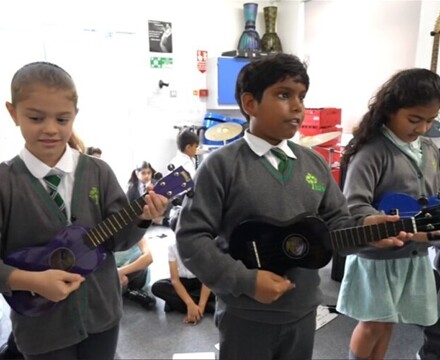
At Kingsbury Green, we believe that Music plays a vital role in the holistic development of our students. Our Music education program is designed to foster a love for music, nurture creativity, and enhance cognitive, emotional, and social skills. We work in collaboration with Brent Music Service (BMS) to provide the best musical educational experience for our children.
Intent:
We strive to instil a lifelong appreciation for various forms of music, exposing our students to diverse genres and cultures.
Music is a powerful medium for self-expression. By nurturing a love for music, we aim to inspire them to explore and create their own musical expressions. We encourage students to unleash their creativity, whether it is through singing, playing instruments, composing, or even dancing. Our Music curriculum provides opportunities for students to express themselves in meaningful ways.
Music often involves group performances, promoting teamwork and collaboration. Our Music classes and ensembles teach students the importance of working together, listening to others, and contributing to a collective artistic effort.
Studies have shown that Music education can positively impact cognitive development. Through rhythm, melody, and harmony, students can improve their memory, language skills, mathematical reasoning, and problem-solving abilities.
Implementation:
Our Music education program is thoughtfully structured to ensure a comprehensive and engaging learning experience for all our pupils. Children’s knowledge, skills and understanding is built upon each year and children are encouraged to make cross-curricular links with their learning.
Our Music curriculum covers a wide range of musical concepts, including rhythm, melody, notation, and Music context (social, historical, cultural). Pupils create links between different styles of Music and explain how they have developed into the Music of today. Pupils explore these links through the pillars of Performance (vocal and instrumental), Composition, and Appraisal (listening, musical analysis, and context). All Music is explored through the following musical elements:
- Pulse
- Rhythm
- Pitch
- Tempo
- Dynamics
- Timbre/Sonority
- Texture
- Harmony
- Structure
Singing holds a special place in our school community. At KGPS, we nurture a culture of singing by hosting weekly singing assemblies for all students from Year 1 to Year 6. In years 5 and 6, pupils have the opportunity to audition to be part of the school choir. Our choir act as ambassadors for the school, representing our school at local events. This includes choir competitions and collaborative performances with Brent Music Service, showcasing the hard work and spirit of our school.
Throughout the curriculum, pupils have the opportunity to experiment with various instruments. This hands-on experience helps them develop their preferences and discover their own personal musical identity. Each year group receives at least one half-term of whole class instrumental teaching:
- Year 1 – Violin
- Year 2 – Recorders and glockenspiels/xylophones
- Year 3 – Trumpets/Trombones
- Year 4 – Drum Pads
- Year 5 – Ukuleles
- Year 6 – Djembes
In addition to our curriculum and choir, we also run two steel pan groups for KS2 pupils, and Sensory Music Sessions for our All Stars class. Through our partnership with BMS, we offer Music Instrumental Lessons on keyboard, flute, clarinet, guitar, violin, trumpet and trombone. Further details for instrumental lessons can be found on the BMS Musical Instrumental Lessons page:
Brent Music Service - Instrumental and Vocal Lessons in Schools
We also provide a Music Enrichment Club once a week. This provides the opportunity for children to learn about a range of instruments and their social and historical context. In the Summer term our children explore what it means to work together as an ensemble to rehearse and perform a song using multiple instruments.
Impact:
The impact of our Music education program is visible in the growth and development of our pupils.
Pupils become more self-assured as they conquer challenges in learning new instruments or performing in front of audiences. This confidence extends beyond Music and positively influences their overall personality as well as developing their sense of character and musical identity.
Through music, students learn to express their feelings, thoughts, and ideas in creative ways. This newfound ability to communicate artistically enhances their emotional intelligence.
Collaborative musical activities teach pupils to listen actively, cooperate, and communicate effectively within a group. These skills are transferable to various social settings.
Music education is linked to improved academic performance. Students who engage with Music often exhibit enhanced concentration, critical thinking, and problem-solving skills, leading to success across subjects.
Pupils at the end of year 6 leave with a lasting appreciation for music's beauty and diversity, enriching their lives and potentially inspiring future musical pursuits.
At KGPS, our Music education program goes beyond teaching notes and rhythms; it nurtures well-rounded individuals who are equipped with valuable skills for their journey ahead. Please contact Mr Williams for more information through: office1@kgreen.brent.sch.uk
Art
Intent
Fundamentally, the subject of art is instrumental in equipping children to become fully rounded individuals. We inhabit a sensory world and are continually required to make sense of imagery, extract meaning and respond to and from our surroundings.
At KGPS we want to promote a healthy curiosity in our children, to explore, appreciate and understand the world around them. In our culturally rich society art is a tool to encourage children to learn about and celebrate different cultures and lifestyles and thereby become more accepting of other people’s beliefs and traditions.
Art then is a vehicle through which children can develop individuality, aid their communication skills and express their ideas. We believe that by finding their own unique and original voice, they can grow in their self-confidence. Building on this confidence and encouraging self-expression, further enriches a child’s ability to reason and explain their intentions. Therefore, art creates a foundation of skills and knowledge that contributes towards preparing them for the future.
When children learn to use a variety of artistic processes and techniques, this develops their fine motor skills. They can learn to present their work beautifully, widen their skill set and deepen their understanding of the formal elements of Art, craft and design. These skills can be transferred across to other subjects, improving overall quality and effective presentation of ideas in all areas.
Finally, when children experience their work on display they can take pride in their achievements and be encouraged that their ideas and efforts are being actively celebrated within their school community.
Implementation
- All pupils in Y1-6 have an hour of art timetabled each week.
- Lessons are taught by our dedicated art teacher
- The curriculum offer is broad and balanced, driven by key knowledge that we want children to acquire. Core knowledge, skills and art history are re-visited over time so that learning goes deeper.
- The teaching pedagogy includes direct instruction/ modelling of new learning supported by retrieval practice of previous skills and knowledge.
- Knowledge organisers support the recall of key information about Art and artists and support the correct use of related vocabulary
Impact
The impact of our art curriculum is measured as follows
- Learning reviews
- Outcome assessment – evaluation of children’s final pieces
- Pupil voice ( ability to express verbally their knowledge, response to art teaching, ideas and links to wider society)
- Knowledge assessments
- Exhibition feedback
French
Intent
At KGPS we aim that through learning French in KS2 children foster curiosity and deepen their understanding of the world through the study of a different country, community and language . We are committed to offering a high quality curriculum that provides an appropriate balance of spoken and written language and lays the foundations for further foreign language teaching at KS3. Through the curriculum we aim that children:
- understand and respond to spoken and written language from a variety of authentic sources
- speak with increasing confidence, fluency and spontaneity, finding ways of communicating what they want to say, including through discussion and asking questions, and continually improving the accuracy of their pronunciation and intonation
- can write at varying length, for different purposes and audiences, using the variety of grammatical structures that they have learnt
- discover and develop an appreciation of a range of writing in the language studied.
Implementation
Children are introduced to French from Y3 in a weekly 60 minute lesson over 2 terms. Prior to this in KS1 children learn French songs and rhymes in Music. Lessons across Key Stage 2 support the skills of speaking, listening, reading and writing and are taught by a specialist French teacher
We follow the primary MFL scheme of work from Camden Primary Languages.
More information can be found here: http://webfronter.com/camden/mfl/menu/mnu3.shtml#m-liid_68317
Key vocabulary is taught and learning is deepened through retrieval practice, low stakes testing and the use of short “essay writing” to show impact of learning
Impact
Our MFL curriculum ensures that children develop their knowledge of where different languages, including the range of home languages spoken by the families of the school, as well as French, are spoken in the world.
Design & Technology
Intent:
“A true design work must move people, convey emotions, bring back memories, surprise, and go against common thinking.” Alberto Alessi.
Design and Technology is a catalyst for creative change. It is vital through the Design and Technology curriculum that we remind ourselves and the pupils that the future will be different and exciting. At Kingsbury Green Primary School, we are currently preparing pupils for jobs that do not exist using technologies that have not been invented to solve problems we do not even know are problems yet. The heart of Design and Technology is about problem solving and evaluating what has been done.
Design and Technology prepares pupils to participate in the rapidly changing technologies of the present and the future. The subject requires pupils to be autonomous and creative problem solvers, as individuals and as members of a team. Design and Technology also allows them to develop their creative skills through planning, designing and making. Pupils can gain great satisfaction from using physical resources to create a product that meets a perceived need. It provides an opportunity for pupils to develop an understanding and knowledge of uses and manufacture of different products. The subject stimulates an interest in design which helps pupils to understand how, throughout history, people have used design to meet their needs and to make progress. There is opportunity to evaluate designs, past and present, which encourages pupils to think critically.
Within the context of the subject, pupils will be given opportunities to work independently and in groups, listening to other’s ideas and treating them with respect. They are given the scope to develop creativity, flexibility and perseverance. They will critically evaluate existing products, their own design and make activities and that of their peers, in a positive, constructive manner. Respect for the environment and for health and safety will be fostered. Through designing and realising their own creations, children will find enjoyment, satisfaction and purpose.
Implementation:
The teaching of Design Technology across the school follows the National Curriculum 2014 guidance, using the Projects on a Page Scheme to develop the Design and Technology curriculum. Children design products with a purpose in mind and an intended user of the products. Food technology is implemented across the school with pupils developing an understanding of where food comes from, the importance of a varied and healthy diet and how to prepare for this.
Design and Technology also embeds our Kingsbury Green Primary School values: Ambition, Character and Empathy. Pupils design and make products using our school value of Ambition – developing new approaches through stimulating their intellectual curiosity and working hard, being open-minded and taking risks by aiming high. The products developed solve real and relevant problems within a variety of contexts which use our school value of Empathy – developing the confidence to collaborate with others and show concern for society. The school value of Character is embedded across all the different Design and Technology stages (design, make, evaluate and technical knowledge) through compassion, resilience and pupils being their best self.
It is cross curricular and draws upon subject knowledge and skills within Mathematics, Science, History, Computing and Art. Through the evaluation of past and present technology they can reflect upon the impact of Design and Technology on everyday life and the wider world.
Impact:
Our Design and Technology Curriculum is developing to provide well thought out lessons and topics that demonstrate progression. In addition, we measure the impact of our curriculum through the following methods:
- reflection on standards achieved against the planned outcomes
- pupil voice about their learning, which includes discussion of their thoughts, ideas and evaluations of work.
As designers, pupils will develop skills and attributes they can use beyond school and into adulthood.
Pupils learn how to take risks, becoming resourceful, innovative, enterprising and capable citizens. Through the evaluation of past and present Design and Technology, they develop a critical understanding of its impact on daily life and the wider world. High-quality Design and Technology education makes an essential contribution to the creativity, culture, wealth and well-being of the nation.
RE
Intent
At KGPS, we aim to foster a deep understanding and appreciation of diverse religious beliefs and practices. We cultivate an environment where children explore, respect, and celebrate the richness of different faiths, enabling them to develop their own understanding of the world around them.
Our intent is to empower pupils with the knowledge, skills, and values to navigate a multicultural society, promoting tolerance, empathy, and a sense of community. Through the lenses of believing, behaving, and belonging, we aspire to instil in our pupils a curiosity about religious diversity, encouraging them to ask questions, challenge perspectives, and develop a sense of identity and belonging within a wider global context.
Implementation
Our curriculum is carefully crafted and is aligned with the DfE Religious education in English schools: Non‑statutory guidance 2010 and the Brent Agreed Syllabus for RE. We have adopted the Ealing teaching sequence which has been tailored to suit our school's context. Through this sequence, children have the opportunity to learn about the six major world religions - Christianity, Judaism, Islam, Hinduism, Sikhism, Buddhism - as well as Jainism, to reflect the diversity of our school community. Additionally, children are given the opportunity to consider the non-religious worldview of Humanism. RE is taught using probing enquiry questions, fostering deep thinking and exploration of religious concepts - giving children an opportunity to make links within and across different worldviews.
The fundamental British Values and Spiritual, Moral, Social, and Cultural (SMSC) elements are interwoven throughout the curriculum. Collective worship during assemblies further enriches our pupils' experiences.
Impact
Success in our implementation is evident through the holistic development of our pupils. Pupils demonstrate a respectful understanding of diverse religious beliefs, displaying empathy, and embracing differences within our school and the wider community.
Regular assessment, reflective practices, and feedback mechanisms will help measure the depth of understanding, tolerance, and appreciation developed by our pupils.
PSHE
What is Jigsaw PSHE?
Jigsaw PSHE is a comprehensive and completely original Scheme of Work for the whole Primary School from Years F1 and 2 through to Year 6. It brings together PSHE Education, emotional literacy, social skills and spiritual development in a comprehensive scheme of learning.
SMSC (Spiritual, Moral, Social and Cultural) development opportunities are mapped throughout. All of these pieces of learning are brought together to form a cohesive picture, helping children to know and value who they are and understand how they relate to other people in the world. Information regarding this can be found below.
Jigsaw contributes, as a good PSHE programme should, to the British Values agenda very significantly, both through the direct teaching of information and through the experiential learning children will enjoy.
The 5 strands of the British Values agenda have been mapped across every Puzzle and every Piece (lesson). Information regarding this can be found below.
Jigsaw also helps to support the Prevent Strategy. The main way in which Jigsaw offers support is through the adoption of a whole-school approach; our school fosters a climate of mutual understanding and respect.
Objectives/Pupil learning intentions: Jigsaw PSHE will support the development of the skills, attitudes, values and behaviour, which enable pupils to:
- Have a sense of purpose
- Value self and others
- Form relationships
- Make and act on informed decisions
- Communicate effectively
- Work with others
- Respond to challenge
- Be an active partner in their own learning
- Be active citizens within the local community
- Explore issues related to living in a democratic society
- Become healthy and fulfilled individuals
There are 6 Puzzles (half-term units of work) each with 6 Pieces (lessons):
- Autumn 1: Being Me In My World
- Autumn 2: Celebrating Differences
- Spring 1: Dreams and Goals
- Spring 2: Healthy Me
- Summer 1: Relationships
- Summer 2: Changing Me
Information for Parent and Carers LeafletRelationships, Sex and Health Education: A Guide for parents (English)Relationships, Sex and Health Education: A Guide for parents (Arabic)Relationships, Sex and Health Education: A Guide for parents (Somali)Relationships, Sex and Health Education: A Guide for parents (Urdu)
British Values in Jigsaw by lessonBritish Values in Jigsaw by Puzzle and Year GroupThe Jigsaw Approach for the Early Years Foundation StageThe Jigsaw Approach for Years 1 – 6
If you want to see our Relationships and Sex Education Policy, please find it on the policies page by clicking here.
